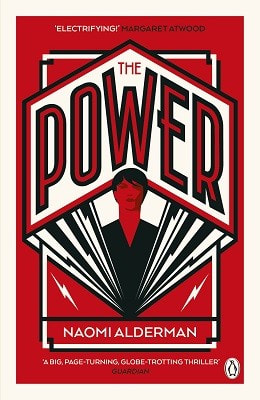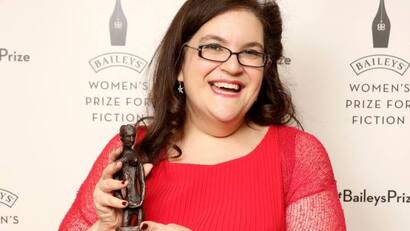Book Review of Naomi Alderman's The Power

The Power by Naomi Alderman is an intelligent and well written dystopian novel that presents a futuristic scenario where women rule the world by strength. Men are seen as the weaker sex and must pay the price of years of sexism and oppresion of women. The Power is presented as a historical novel, written from thousands of years in the future by male writer Neil. Adam Armon. Alderman has fun using an anagram of her own name asking the question of Neil whether he would be better to publish his book as a woman in order to avoid being labelled as “men’s literature’.
The story is told through the viewpoints of four main characters. The first is Allie, an adopted girl abused by her father. She escapes repeated beatings and rapes. She becomes Mother Eve and thus the reader is able to see how religion can be used to suppress, lead and oppress. A further key character is Roxy, the daughter of a criminal London gangster. Roxy has been brought up to see power linked to violence and wealth and has witnessed how men have gone to any and all lengths to attain it. A further key character is Tunde, a handsome young reporter, who discovers what it is like to be desired in a world of utter female domination. Finally we see aspects of the changing society through American politician Margot, who is prepared to abuse, manipulate and cheat for self-gain.
The reader explores these characters’ changing perspectives as they learn to manage, use and fear the the power provided through the skein. The novel has a certain Animal Farm quality. The reader hopes for a future world run by women based on empathy, love and kindness but it never materializes. Ultimately ‘all animals are equal, but some are more equal than others”.

Book Discussion Questions on Naomi Alderman's The Power
Why does Naomi Alderman give the women a super power associated with electricity?
In the text the women are sometimes said to have enacted cruel and barbaric acts, such as the rape of men simply because ‘they can’. How do you interpret this phrase?
What do you find the most troubling aspect of Naomi Alderman’s The Power?
Is there a romantic future for Roxy and Tunde? Discuss why or why not?
Naomi Alderman using religion as a prop for Mother Eve’s rise to power. Explore why she does this?
If Alderman is critical of religion, then it is religion as a whole rather than particular religious denominations. Explore why she does this and what you think her attitude to organised religion is.
Out of the four main characters, Margot, Allie, Roxy and Tunde, who do you have most sympathy for and why?
What is Naomi Alderman telling the reader through the horrific scenes of sexual abuse and violence perpetuated by women that she writes? Explore your emotional and rational response to these scenes.
Is the society in Alderman’s The Power that existed before the women discover their strength a representation of today’s world?
Explore the relationship between Roxy and Allie. What observations can you make about it?
Is Mother Eve corrupt?
Who is the voice in Allie’s (Mother Eve’s) head? Does it successfully guide her? Is Mother Eve actually mad?
The book is written as a historical text set thousands of years in the future. Discuss whether you think this is an effective way of narrating the story.
What did you find most unsettling about reading The Power?
What did you find most enjoyable about reading The Power?
The Power is pitched as being a thriller. Is it? What genre would you ascribe to it? Why?
Do you consider the revolutions that occured in Riyadh and Delhi to have been successful? Why or why not?
If Naomi Alderman was in the room what question would you ask her?
What do you think the illustrations added to the story?
What stereotypical qualities of men does Alderman mock through in the text? How does she do this?
What is the main factor that drives Margot’s ambition? Does she remind you of any modern day politicians? Who? Is Margot someone you can admire? Why or why not?
How do you think the book resonates differently for male and female readers?
Do Roxy and Tunde have a romantic future?
Sex in the book is often based on pain and dominance. Discuss.
“A little power is a dangerous thing’. Discuss this quote in reference to Aldermans’ The Power?
Is Naomi Alderman’s The Power a worthy winner of the Women’s Prize for Fiction? Why or why not?
What are the three main themes of The Power? Rank them in order of importance discussing the reasons behind your choices.
Discuss the relationships between fathers and daughters in the book.
Bookclub Questions on Naomi Alderman's The Power (if you haven't read the book!)
What do you think would happen in today’s world if women suddenly gained more physical strength than men?
In The Power women are encouraged to pray to female religious figures rather than the traditional male ones. Do you automatically think of God as a man?
What super power do you think would benefit women most in our modern world?
What super power would you choose to have?
Women become powerful in the story after having gained physical strength. It is this that gives them supremacy over men. What qualities do you think are needed to lead in a modern society?
Which woman in a position of power do you most admire and why?
Which woman in a public position of power troubles you? Why?
Do you think true equality between men and women is ever possible? Why or why not?
Personal Response to Naomi Alderman's The Power
Cosmopolitan magazine describe The Power as a cross between The Hunger Games and The Handmaid’s Tale. I thought this summed it up well. The review made me smile. It is interesting to see that Margaret Atwood was actually a mentor of Alderman during her writing of The Power. Atwood is, I think, the Queen of the dystopian text and a front runner of feminist literature, so it must have been an honour for Alderman to be able to thank Atwood in the acknowledgements.
I enjoyed The Power, but there were aspects of it that I didn’t fully understand and need to revisit. I need to take more notice of how and why the revolutions occured in Riyadh and Delhi. I am also confused as to what or who exactly the voice in Mother Eve’s head was. I am interested in exploring further the role her abusive mother played in the years following her escape from home. I’m happy to have these questions to ponder further on and it is the sign of having engaged fully in the text. There is a lot to dissect and review in the The Power. It would make a great bookclub choice.